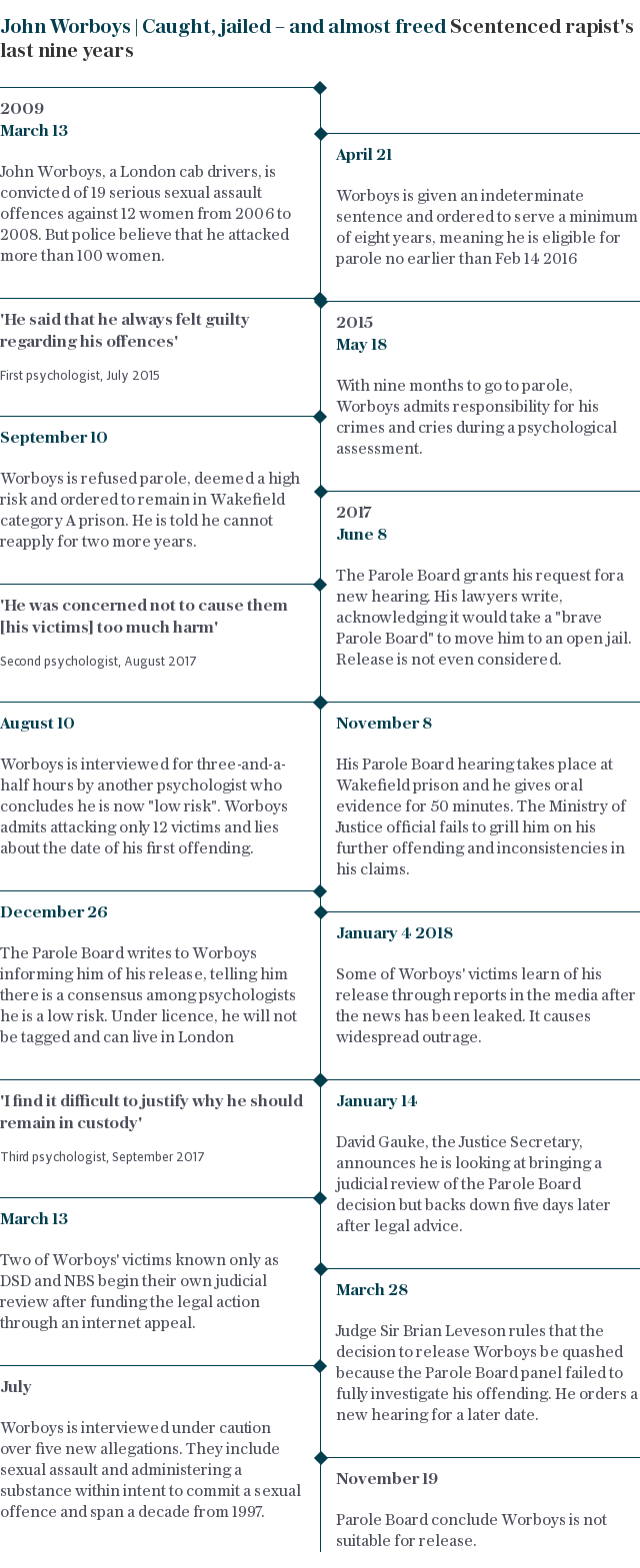Black cab rapist John Worboys should stay in prison for rest of his life, Justice Secretary says

Black cab rapist John Worboys should stay in prison for the rest of his life, the Justice Secretary David Gauke indicated today, as he defended his decision not to challenge the original ruling.
Asked if the multiple rapist should never be released from jail, he said: “If there is evidence that he is a continued risk - as it appears to be the case here - then clearly he should not be freed.”
Mr Gauke acknowledged it was ultimately a decision for the Parole Board but said new measures had been put in place to prevent a repeat of the controversy when a Board panel decided Worboys, 61, should be freed earlier this year.
That decision was overturned by the High Court in March following a legal challenge brought by his victims. It was ruled the panel which approved Worboys' release had failed to explore a wider pattern of alleged offending.

Speaking on the BBC Radio 4's Today programme, Mr Gauke defended his decision not to seek a judicial review of the original Parole Board, claiming it would have prejudiced legal action by the victims.
“There were a number of allegations of other crimes that had been committed and the original parole board did not look closely at a wider pattern of behaviour,” he said.
“I had my concerns about what had happened but the advice I received was that I was not well placed to bring a judicial review. If I did, then it might have prejudiced the victims from bringing a judicial review.”
Yesterday a new Parole Board panel confirmed Worboys, who was convicted in 2009 for attacks on 12 women, was not suitable for release.
According to the High Court, the taxi driver, who drugged women before raping them in the back of his cab, probably assaulted more than 100 women.
Under current legislation Worboys will be eligible for a further review within two years. The date of the next review will be set by the Ministry of Justice.
However, Mr Gauke added: “We are changing the system. There’s a reconsideration mechanism.
“Rather than having to go to judicial review, what will be available to victims and the Justice Secretary will be an ability to get a decision reconsidered if there’s something wrong with it.
“That wasn’t the case before. So I hope we are drawing a line under that so we don’t see a repeat of what happened with the Worboys case.”

Among the documents considered by the new panel were a 1,255 page dossier on Worboys and personal statements from seven victims.
A summary of yesterday’s decision said: "Having considered the Index Offences and all the evidence before it, the panel listed risk factors associated with Mr Worboys, including sexual preoccupation, a sense of sexual entitlement, his attitudes towards women [including a need to have sexual contact with women and to control women], a belief that rape is acceptable, alcohol misuse and problems with relationships."
Worboys "submitted that he had worked very hard to accept and understand his offending", the summary said.
It added: "However, the panel considered there to be a need to further understand risk factors and triggers to his offending."
Witnesses described "positive behaviour" in custody since Worboys's last parole review, but they did not support release or progression to open conditions within their reports, the summary said.
It concluded: "After considering the circumstances of offending, the progress made while in custody, and the evidence presented within the dossier, the panel was not satisfied that Mr Worboys was suitable for release or progression to the open estate."
The Parole Board assesses whether serving prisoners in England and Wales are safe to be released into the community or moved to open conditions, considering around 25,000 cases a year.
Earlier this month, parole board chairman Caroline Corby said the body had suffered a "loss of confidence" in the wake of its error over releasing Worboys.
Ms Corby's predecessor, Nick Hardwick, was forced to quit after the High Court ruling.
Professor Hardwick stepped down as chair after being told by David Gauke, the Justice Secretary, that his position was untenable.

 Yahoo News
Yahoo News 
